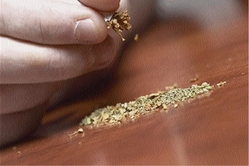My child is smoking weed
Published: Wednesday | May 27, 2009

I AM WHAT I THINK
How does cannabisaffect the brain?
Cannabis increases several chemicals in the brain; one of these is called dopamine. When the level of dopamine is increased, there is a sense of well-being and relaxation. High levels of dopamine are also associated with mental problems.
Common effects of cannabis include the following:
1) Panic attacks
2) Paranoid reaction
3) Memory loss
4) Erratic and aggressive behaviour
5) Disruption in motor coordination
6) Cannabis may induce or worsen mental disorders.
Panic attacks: Many people who use cannabis experience panic attacks. A panic attack is associated with racing heart, heavy breathing, tingling sensations in the body and feeling that one is going crazy.
Paranoid reaction: This is a very common effect of cannabis use in young people. Often people who have paranoid reactions have the feeling that others are discussing or watching them. People with a paranoid reaction will accuse others of trying to poison them and they will not eat from anyone. Most paranoid people prepare their own meals. Paranoid people also often accuse the government or the police of being against them, report that their telephone is tapped or that devices are planted in their houses to spy on them.
Memory loss: Cannabis may cause problems with memory and learning. This effect is short term and reversible, but it may affect performance in school and examinations.
Effect on behaviour: Many people who use cannabis display very erratic and aggressive behaviour. Their erratic behaviour and paranoid feeling often get them into fights. They also appear restless and very disorganised.
Motor coordination: Cannabis affects motor coordination and may cause drowsiness. In addition cannabis use affects judgement of distance and reaction to signals and sounds. This affects one's ability to drive cars or operate machines. These effects are worsened when cannabis is taken with alcohol. This is of major importance here in Jamaica, as it is common for drivers, including those who operate public transportation and heavy duty vehicles, to smoke cannabis and take alcohol while driving or operating heavy machinery.
Cannabis and mental illness: Research has shown that cannabis is linked to mental disorders, such as schizophrenia. In this disorder, people will have hallucinations, that is, they may hear voices talking to them or see things that others are not seeing. As the disorder progresses, the individuals may become withdrawn or very aggressive. This condition is also associated with paranoid behaviour described above.
Dr Wendel Abel is a consultant psychiatrist and head, Section of Psychiatry, Department of Community Health and Psychiatry, University of the West Indies; email: yourhealth@gleanerjm.com.

What to say or do for cannabis users
1. Seek professional help. Merely talking to young people will not reduce cannabis use. The teaching and preaching often does not help. It may require the help of a trained professional.
2. Addiction begins and ends with pain. Many young people use cannabis because they want to feel better. They may be unhappy or sad, usually because of problems in the family. Fix the underlying problem before you try to fix the cannabis use.
3. Detox does not really help. Many people think that sending an individual for detox will solve the problem. Sending an individual to a detox unit has a low success rate. There is also the misconception that when an individual goes to detox, they are given a washout. This is not so. In detox they get therapy, participate in groups and hopefully some of their problems are dealt with. These interventions can be done without admitting the person to a detox unit.
4. Caregivers should learn new techniques. There are interventions that have modest success rates. Caregivers such as counsellors, guidance counsellors and psychologists should ensure that they are trained in these interventions. For more information call 977-0423.
Cannabis, also known as ganja, weed and pot, is the most widely used illicit drug in Jamaica. Approximately one in three young people admit to ever smoking cannabis.


